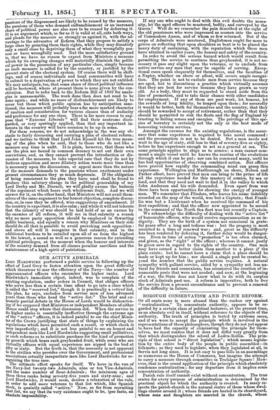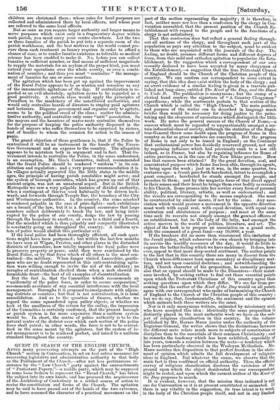BOROUGH CONSERVATISM AND POLICE REFORM. OF all cants none is
more abused than the cuckoo cry against " centralization." To concentrate authority, appears to be re- garded by a certain class of political lecturers, at the present time, as an absolute evil in itself, without reference to the objects of the authority. The truth of principles is tested by extreme cases, and if we were to accept the principle which is involved in the representations of these philosophers, though they do not yet appear to have had the capacity of eliminating the principle for them- selves, we must confess that it does not differ very greatly from that which distinguishes the school of Learn-Rollin. The prin- ciple of that school is " direct legislation"; which means 1 tioa by the entire body of the people in public assemble —in folkmote ; as they used to legislate, when they legislated at all, in Servia not long since. It is not easy to pass bills in an assemblage so numerous as the House of Commons, but imagine the attempt to carry a measure through committee in Trafalgar Square ! How- ever, that is the sound application of the principle which absolutely condemns centralization ; for any departure from it implies some concentration of authority.
Parish rule itself cannot exist without concentration. The true centre for every purpose of administration is determined by the practical object for which the authority is created. In many re- spects the parish-church is the natural centre of those whose dwel- lings cluster around it ; whose friends are buried in its churchyard, whose sons and daughters are married in the church, whose.
children are christened there; whose rates for local purposes are collected and administered there by local officers, and whose poor are referred to the same local officers.
But as soon asyou require larger authority and larger means to serve purposes which exist only in a fragmentary degree within each parish, you must carry your centre elsewhere. Let the two or three lunatics of the parish be put into a separate room of the parish workhouse, and the best motives in the world cannot pro- cure them such treatment as lunacy requires in order to afford a chance of cure, or to render lunatic existence as tolerable as medical science has been enabled to make it. No, before you can collect lunatics in sufficient number, or find means of sufficient magnitude to supply the materials for an asylum of the proper kind, you must extend your operations over the whole county, or over a combi- nation of counties ; and thus you must " centralize " the manage- ment of lunatics for one or more counties.
The agitation which has been got up against the improvement of the Rural Police appears to be as wanton and senseless as any of the innumerable agitations of the day. If centralization is re- garded as an evil absolutely, agitation seems to be regarded as a good positively. A certain class would apply the principles of Proudhon to the machinery of the constituted authorities, and would only centralize boards of directors to employ paid agitators and lecturers. Disperse government and organize only to agitate, seems to be the political creed of the class ; scatter the adminis- trative authority, and centralize only some "anti" association. So the mayors and the haunters of mares-nests centralize themselves for the purpose of keeping the police authority dispersed in the hands of mayors who suffer themselves to be surprised by rioters, and of beadles to whom the occasion for action is the season of panic. The grand objection of these gentlemen is, that if the Police be centralized it will be an instrument in the hands of the Execu- tive Government and an expense to the country. The allegation appears to be mistaken both in argument and in fact. That Go- vernment intends to centralize the Police, in the sense understood, is an assumption. Mr. Rice's Committee, indeed, recommended that the Rural Police should be rendered " uniform" in its con- stitution and regulation ; and a very proper recommendation it is. In villages actually separated like the little states in the middle ages, the principle of having parish constables might serve; and the system of borough constables, which has grown up out of that ancient origin, was not an unnatural sequel. But in the British Metropolis we saw a very palpable instance of divided authority, when a contingent of thieves used habitually to be driven back- wards and forwards through Temple Bar, the boundary of the City and Westminster authorities. In the country, the same mischief is rendered palpable in the case of prize-fights : such exhibitions are a breach of the law, but it is a frequent occurrence that large numbers collect deliberately to break the law, and being inter- rupted by the police of one county, dodge the law by passing through the boundary to another, or even to a third and a fourth. But the mischief which is thus palpably and compactly illustrated is constantly going on throughout the country. A uniform sys- tem of police would abolish this particular evil.
If the local police had been thoroughly efficient, all such ques- tions might have been postponed ; but within the last few months we have seen at Wigan, Preston, and other places in the disturbed districts of Lancashire, how totally impotent the local police were to preserve property or peace, until they were reinforced by the Rural Police, or by that force which of all others is the most cen- tralized—the military. When danger visited Lancashire, gentle- men who are no doubt represented in this anti-centralizing agita- tion were willing enough to invite the aid of the military ; no scruples of centralization checked them when a mob showed its formidable front—the best of all examples of discentralization.
But the fact is, that the Committee which recommends an "uniformity of the police force, in order to secure cooperation," recommends avoidance of any essential interference with the local management. Boroughs it is proposed to amalgamate with adjoin- ing districts or counties ; but that is not centralization, it is 'octal consolidation. And as to the question of finance, whether we regard the sums squandered upon paltry objects, or whether we look at the smallness of the return for the outlay, the impression of the Committee is certainly confirmed, that the present borough er parish system is far more expensive than a uniform system would be. In short, the centre of police authority is to be the natural centre of the district over which each section of the police force shall patrol; in other words, the force is not to be central- ized in the sense meant by the agitators, but the system of lo- cal management is to be rendered perfect, and raised to a uniform standard throughout the country.



































 Previous page
Previous page